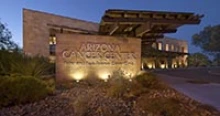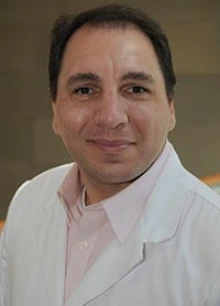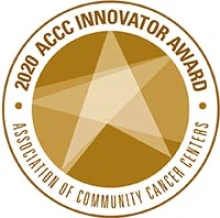UArizona Cancer Center Honored with 2020 Innovator Award
Efforts to keep patients safe in the time of COVID-19 led to significant savings and innovation in chemotherapy delivery and earned University of Arizona Health Sciences center national recognition.
TUCSON, Ariz. – The Association of Community Cancer Centers has honored the University of Arizona Cancer Center at the UArizona Health Sciences with its 2020 Innovator Award.

The Peter and Paula Fasseas Cancer Clinic at University of Arizona Cancer Center in Tucson
The award recognizes forward-thinking Association of Community Cancer Centers Program members who have created innovative and replicable solutions while demonstrating the real-world impact on the delivery of cost-effective, patient-centered care. The UArizona Cancer Center was recognized along with seven other awardees from across the nation.
To help ensure patient safety in the time of COVID-19, the UArizona Cancer Center – which is affiliated clinically with Banner – University Medicine with two hospitals in Tucson, Banner – University Medical Center Tucson and Banner – UMC South – created a multidisciplinary team that identified chemotherapy regimens administered in the inpatient setting that could be safely administered in the outpatient setting. The team created and implemented a transition plan that reduced inpatient medical resources and chemotherapy costs, decreased inpatient bed stay, lowered infection rates and improved quality of life.
The effort decreased overall cost of care which resulted in a conservative estimate of $6 million in savings.

Ali McBride, PharmD, MS
“Continuous improvement in quality of the care for patients with reduced cost costs is an essential goal in oncology care. This program successfully does both and showcases how a multidisciplinary team can achieve results through collaboration. The shift in chemotherapy administration from inpatient to outpatient resulted in an important measurable decrease in overnight hospital stays and an impressive overall cost reduction for the system. This team has developed a plan that can be replicated nationwide,” said Ali McBride, PharmD, MS, clinical coordinator of hematology/oncology at the UArizona Cancer Center and an assistant professor in the UArizona College of Pharmacy.
Dr. McBride and Daniel Persky, MD, with UArizona Cancer Center’s Therapeutic Development Program, explain the process in a video at this link.
Winners were selected based on the potential of their program to have a real-world impact on the delivery of cost-effective, patient-centered care with replicable solutions in the areas of care coordination and quality improvement, technology, patient engagement, innovative training and staffing models, the provision of supportive care services, and collaborative practice agreements.

“During these unprecedented times, cancer care professionals are looking for new and more accessible ways to stay engaged and learn from the challenges and successes of their peers. This year’s ACCC National Oncology Conference provides an opportunity to collaborate and discover pioneering ideas that address the challenges of providing cancer care in our new reality,” said Randall A. Oyer, MD, ACCC president and medical director at the Ann B. Barshinger Cancer Institute, Penn Medicine Lancaster General Health.
In addition to the presentation of the 2020 ACCC Innovator Awards, the ACCC’s 37th [Virtual] National Oncology Conference includes facilitated and interactive roundtable discussions on “hot topic” issues like cultural humility and sensitivity, ramping up outreach and prevention programs in a COVID-19 world, mentoring those new to oncology, and more, as well as live keynote addresses on effective leadership during challenging times and addressing the disparity of women in oncology after which attendees will be able to ask questions in real time. Registrants will also have an opportunity to interact in real-time and ask follow-up questions with the 2020 ACCC Innovator Award winners on Thursday, Sept. 17.
Cancer professionals can find more information on the agenda and register to attend on the ACCC website.
# # #
NOTE: Images available here – https://arizona.box.com/s/2kyu1nsfx2co7cypro5w7y39wpd6zpcc.
About the Association of Community Cancer Centers
The Association of Community Cancer Centers (ACCC) is the leading education and advocacy organization for the cancer care community. Founded in 1974, ACCC is a powerful network of 25,000 multidisciplinary practitioners from 2,100 hospitals and practices nationwide. As advances in cancer screening and diagnosis, treatment options, and care delivery models continue to evolve – so has ACCC – adapting its resources to meet the changing needs of the entire oncology care team. For more information: accc-cancer.org (Follow us: Facebook | Twitter | LinkedIn). Read our blog, ACCCBuzz; and tune in to our podcast, CANCER BUZZ.
About the University of Arizona Cancer Center
The University of Arizona Cancer Center is the only National Cancer Institute-designated Comprehensive Cancer Center with headquarters in Arizona. The UArizona Cancer Center is supported by NCI Cancer Center Support Grant No. CA023074. With primary locations at the University of Arizona in Tucson and at Dignity Health St. Joseph’s Hospital and Medical Center in Phoenix, the Arizona Cancer Center has more than a dozen research and education offices throughout the state, with more than 300 physicians and scientists working together to prevent and cure cancer. For more information: cancercenter.arizona.edu (Follow us: YouTube).
About the University of Arizona Health Sciences
The University of Arizona Health Sciences is the statewide leader in biomedical research and health professions training. UArizona Health Sciences includes the Colleges of Medicine (Tucson and Phoenix), Nursing, Pharmacy, and the Mel and Enid Zuckerman College of Public Health, with main campus locations in Tucson and the Phoenix Biomedical Campus in downtown Phoenix. From these vantage points, Health Sciences reaches across the state of Arizona, the greater Southwest and around the world to provide next-generation education, research and outreach. A major economic engine, Health Sciences employs nearly 5,000 people, has approximately 4,000 students and 900 faculty members, and garners $200 million in research grants and contracts annually. For more information: uahs.arizona.edu (Follow us: Facebook | Twitter | YouTube | LinkedIn | Instagram).

